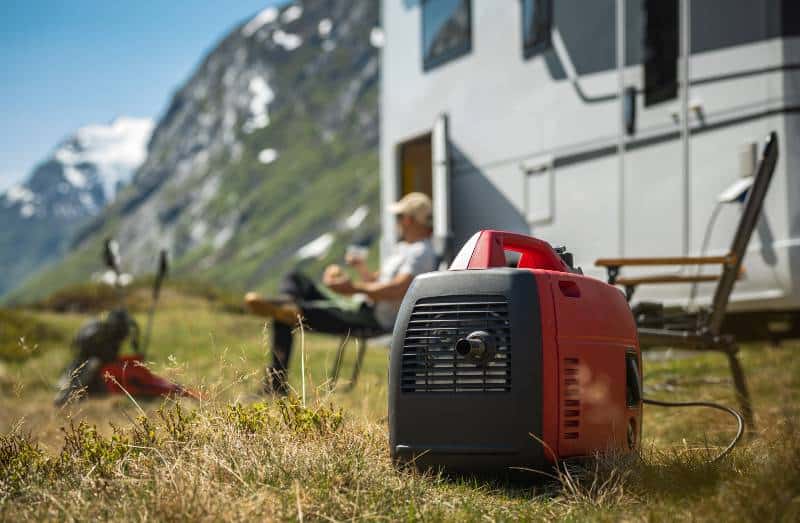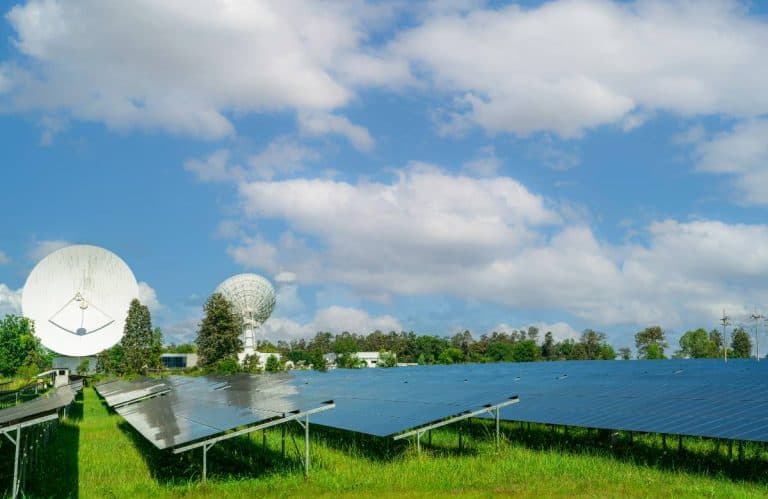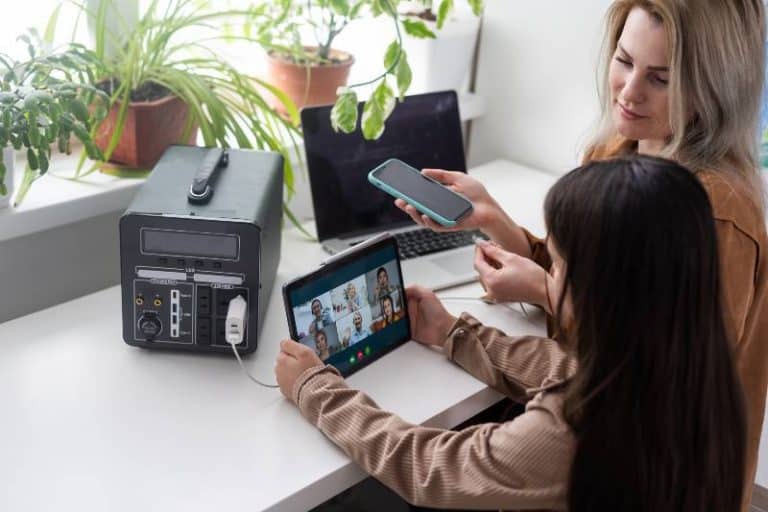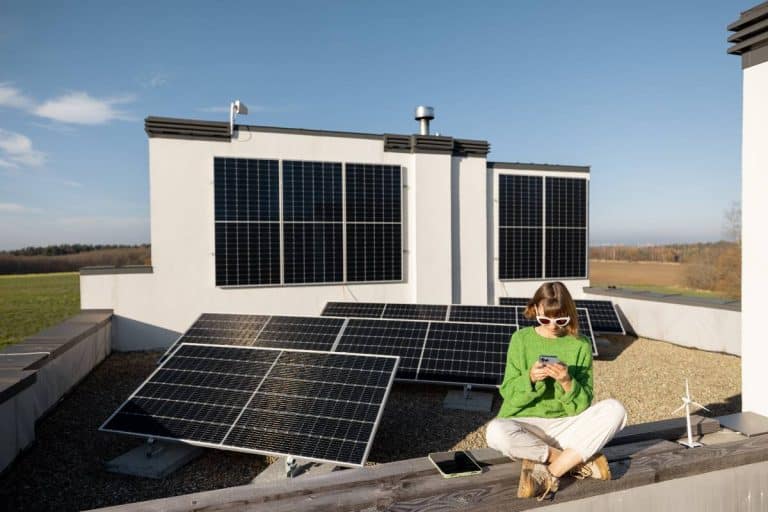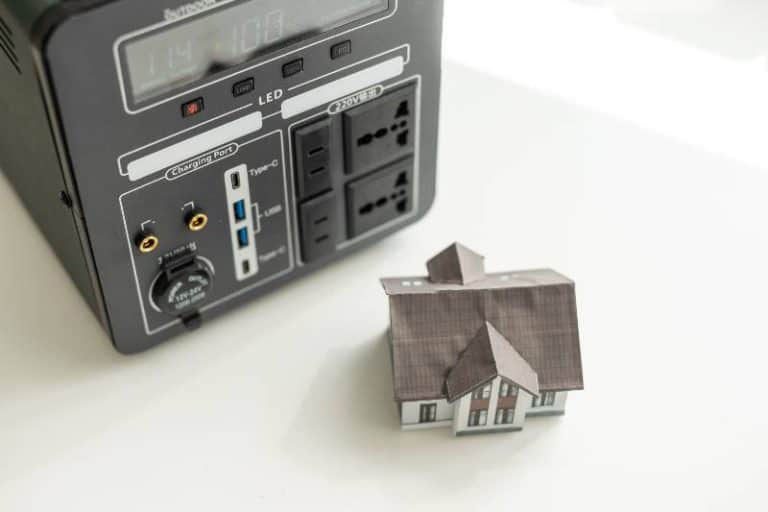Overcoming Blackouts: The Power of Portable Solar Generators
Are you feeling powerless because of an electricity blackout in your area? It’s always a challenging experience, particularly when it lasts for days and cuts off access to power. But don’t despair! Portable solar generators might be the perfect solution for you—and we’re here to tell you why they should be part of your pre-blackout list of supplies.
As more and more natural disasters occur, or if other circumstances cause prolonged blackouts, having a portable solar generator ready can let you keep essential appliances like refrigerators, lights, and medical equipment running. This blog post explains all the benefits that come with these powerful yet compact devices so that their reputation as lifesavers lives on!
Nowadays, a solar generator refers to a portable power station that uses a solar panel to provide electricity instead of fossil fuels. It captures the sun’s energy then stores it in a battery to be used whenever needed.
Key Takeaways
- Portable solar generators offer an environmentally friendly and dependable power source during electricity blackouts.
- While there’s an initial investment, solar generators can save money over time, eliminating fuel costs and reducing maintenance.
- Solar generators provide a safe and efficient way to ensure power continuity during emergencies, making them a valuable asset for homes and businesses.
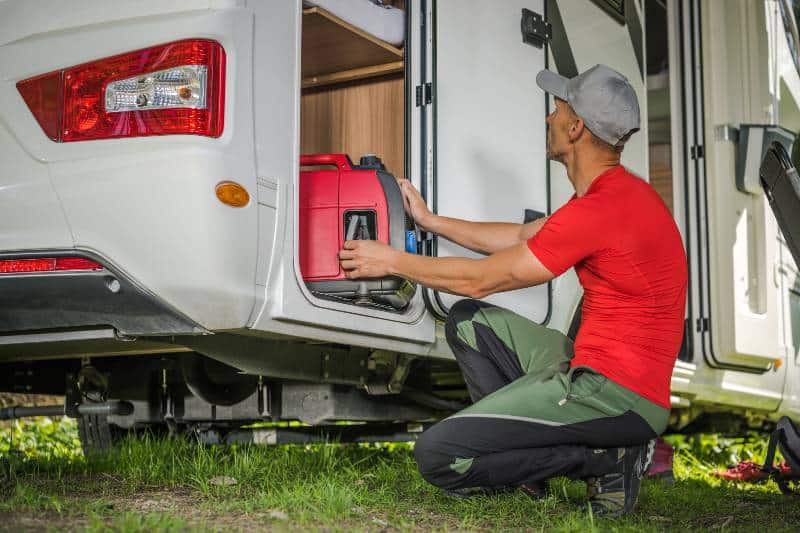
What is a Portable Solar Generator?
A Portable Solar Generator is a compact, transportable system that employs solar panels to harness the sun’s energy to produce electricity. This ingenious device allows people to access power in remote locations, during emergencies, or while off-grid. It has gained popularity due to its eco-friendly nature, being noiseless and requiring low maintenance compared to traditional fuel-driven generators.
Components
A Portable Solar Generator typically consists of the following components:
- Solar Panels: The primary source for generating electricity within the system. Solar panels contain photovoltaic cells that convert sunlight into electrical energy.
- Charge Controller: This device regulates the flow of electricity, ensuring that the battery doesn’t overcharge or get damaged by voltage fluctuations.
- Battery: Acting as an energy-storage unit, the battery preserves the generated power to be utilized when needed. Batteries and their abilities can vary, with some providing more capacity or longer lifecycles.
- Inverter: The inverter converts the direct current (DC) produced by the solar panels into alternating current (AC) to power everyday devices and appliances.
- Inputs & Outputs: A Portable Solar Generator usually features multiple input and output ports, allowing for the connection of various electronic devices and compatibility with different solar panels.
How Portable Solar Generators Work
Portable Solar Generators primarily work by collecting energy from the sun through solar panels and converting it into usable electricity. The following steps outline the process in detail:
- When the sun’s rays hit the solar panels, the photovoltaic cells within the panels begin to generate direct current (DC) electrical energy.
- This generated energy flows from the solar panels to the charge controller, which regulates the voltage and current to protect the battery from overcharging or potential damage.
- The regulated energy reaches the battery, where it is stored for later use. The capacity of the battery will determine how much energy it can store and, subsequently, the duration for which it can power devices.
- Once you need to use the stored energy, the inverter comes into play. It converts the stored DC electricity within the battery into alternating current (AC), the standard form of electricity required for most everyday devices.
- Finally, you can plug your electronic devices or appliances into the generator’s output ports, and they will draw power from the generated and stored energy.
Portable Solar Generators are especially useful when traveling to remote places, during power outages, or for reducing reliance on the grid. In addition to being environmentally friendly, they are quiet, making them an ideal choice for campsites, picnics, and other outdoor recreational activities. So, the next time you’re seeking an alternative power source, you may want to consider a Portable Solar Generator!
Benefits of Using Portable Solar Generators during Blackouts
In today’s fast-paced and technologically driven world, a blackout can impose a major inconvenience. However, thanks to technological advances, Portable Solar Generators can turn a potentially frustrating situation into a manageable one. Let’s explore these benefits in greater depth:
Environmentally Friendly
A core advantage of Portable Solar Generators is their environmentally friendly nature. Unlike fossil fuel-based generators, solar generators harness the sun’s energy – an abundant and renewable source. This process emits no harmful gases or contributes to carbon footprint, making it a clean, green solution. So, when you switch on your solar generator during a blackout, you’re not just illuminating your home, but also making a conscious effort to reduce environmental harm. It’s a win-win situation!
Cost-Effective in the Long Run
While the initial investment for a Portable Solar Generator may seem steep to some, it actually becomes cost-effective over time. There are no fuel costs attached, and the maintenance expenses are minimal, mainly because there’s no combustion engine involved. Plus, sunlight, being the main ‘fuel,’ is free and abundant. By using a solar generator during blackouts, you’re essentially using free power from the sun, which could lead to a significant reduction in your electricity bills over time.
Reliable and Sustainable Power Source
Last but certainly not least, Portable Solar Generators provide a reliable and sustainable power source. The sun, although subject to weather and seasonal changes, is one of the most reliably predictable energy sources on Earth. Solar generators can store excess energy and use it at night or on less sunny days. Best of all, during a blackout scenario, while others would rely on the power grid to be restored, you would have your own private energy supply, getting you through the outage seamlessly.
In essence, the use of Portable Solar Generators during blackouts offers a great combination of environmental consciousness, long-term cost efficiency, and power independence. It’s like your personal insurance against power interruptions while also contributing to a healthier planet and decreased power expenses. So the next time there’s a power outage, with a Portable Solar Generator, you’ll keep the lights on, and carry on with a smile!
Comparing Solar Generators to Traditional Generators
When it comes to choosing a generator, there is often a debate between Solar Generators and their traditional, fossil fuel-based counterparts. Let’s delve into the comparisons and better understand the differences in noise levels, fuel requirements, and maintenance and longevity aspects of the two options.
Noise Levels
Traditional generators, which usually run on gasoline, diesel, or propane, rely on the internal combustion process to create power. This process can generate significant noise as the engine operates, and it can often be loud enough to disturb your peace and tranquility, especially in residential spaces or camping sites.
On the other hand, Solar Generators produce power as a result of the photovoltaic effect. There is no combustion engine; therefore, the noise from solar generators is virtually non-existent. This makes them an ideal choice for environments where a quiet atmosphere is highly desirable, such as recreational camping, residential neighborhoods, or even temporary outdoor workstations.
Fuel Requirements
Traditional generators require a constant supply of fossil fuels, such as gasoline, diesel, or propane, to operate. These fuels, apart from being scarce and non-renewable resources, also contribute to air pollution and create additional expenses. Furthermore, the depletion of these fuels over time could lead to a rising cost, which could impact the affordability of traditional generators in the long run.
In contrast, Solar Generators harness the power of the sun, which is a free, renewable, and abundant energy source. There are no recurring fuel costs associated with solar generators, which helps save you money in the long run. Additionally, the solar energy generation process is environmentally friendly, contributing positively towards global carbon footprint reduction goals.
Maintenance and Longevity
Traditional generators, with their combustion engines and exhaust systems, require regular maintenance, including frequent oil changes, air filter replacement, and the management of fuel storage, among other tasks. Failing to maintain a traditional generator may lead to reduced lifespan or poor performance.
Solar Generators, on the other hand, have fewer moving parts, which translates to much lower maintenance needs. The main routine tasks associated with solar generators are cleaning the solar panels to ensure the unobstructed flow of sunlight and occasionally checking the battery connections for any signs of wear or corrosion. This low-maintenance design contributes to a longer lifespan for most solar generators while requiring less effort to keep them in optimal condition.
Solar Generators offer several advantages over their traditional counterparts. They are quieter, more environmentally friendly, and tend to be more cost-effective and low-maintenance in the long run. While initial investment costs might be higher for a Solar Generator, the long-term benefits could prove to be well worth the investment, offering you peace of mind and a consistent, renewable energy source during any blackout or off-grid situation.
Don’t let your thirst for adventures in the wild be dampened by power worries. Equip yourself with important information from our useful article, ‘Off-Grid Power: Top Portable Solar Panels for Camping Trips.’ This insightful guide provides valuable insights into the best portable solar panels for all of your outdoor escapades. Make this must-read your companion and take the guesswork out of your camping preparations!
How to Choose the Right Portable Solar Generator
Selecting a Portable Solar Generator that best suits your needs can be a challenging task, given the various options and factors to consider. To make the decision-making process more manageable, let’s review some essential aspects to keep in mind: capacity and power output, portability and weight, and price and brand reputation.
Capacity and Power Output
The capacity and power output of a Portable Solar Generator determine the types of devices it can power and for how long it can do so. When assessing generators, pay close attention to the battery capacity (measured in watt-hours or ampere-hours) and the inverter’s power output (measured in watts). These factors will help you gauge if the generator can handle your desired devices and appliances – such as smartphones, laptops, or even small refrigerators – and provide adequate energy to run them.
Consider your typical power requirements during a blackout or off-grid situation, and opt for a system that can meet or exceed those needs. Keep in mind, however, that larger storage capacity and output could increase the generator’s overall size and cost.
Portability and Weight
The primary benefit of a Portable Solar Generator is, as the name implies, its portability. You’ll want to choose a generator that strikes a balance between capacity and ease of transport. This involves examining the generator’s form factor, weight, and any built-in or included portability-enhancing features (such as handles or wheels).
Lighter, compact generators are suitable for camping, picnicking, or other mobile purposes, but they may have lower power capacities. In contrast, larger generators can fulfill more demanding power needs but may require additional effort to move or store. Determine your specific use case to ensure the generator you choose is portable enough to meet your requirements without sacrificing necessary power capabilities.
Price and Brand Reputation
Lastly, price and brand reputation play a significant role in choosing the right Portable Solar Generator. The generator’s cost is influenced by factors like battery capacity, power output, portability, and additional features. Establishing a budget beforehand is essential, as it will help narrow down your options and prevent overspending.
Simultaneously, consider the reputation and trustworthiness of the generator’s manufacturer. A reliable brand often ensures product quality, customer support, and warranty coverage, which are essential factors when making a long-term investment. Do your research by reading customer reviews, expert opinions, and comparison articles to gauge the overall satisfaction with the generator and the company behind it.
Finding the ideal Portable Solar Generator involves carefully considering an array of factors that match your individual needs and preferences. By paying close attention to capacity and power output, portability and weight, and the price along with brand reputation, you will be well-equipped to make an informed decision and choose the generator that can best support you in any blackout or off-grid situation.
Setting Up and Using Your Solar Generator
Once you’ve chosen the perfect Portable Solar Generator, knowing how to set it up correctly and use it effectively is key. Here are some helpful tips on positioning the solar panels and maintaining and caring for your generator, as well as crucial safety precautions to keep in mind.
Best Practices for Positioning Solar Panels
Solar panels generate power by converting sunlight into electricity, so their positioning can significantly impact their efficiency. Ideally, place the panels in an open location with direct exposure to sunlight. Avoid shaded areas that could limit the amount of sunlight they can harness. Adjustable mounts come in handy, as they allow you to alter the panels’ tilt and orientation to receive maximum sunlight throughout the day.
In the Northern Hemisphere, it’s usually best to face panels to the south for the most direct sunlight access, and vice versa in the Southern Hemisphere. Also, remember to periodically check your panels and adjust their position according to the season, as the sun’s path changes throughout the year.
Maintenance and Care
Solar generators require minimal maintenance compared to their traditional counterparts. However, even with their low-maintenance nature, a few routine tasks are necessary. Firstly, keep the solar panels clean and free from dust, bird droppings, or other obstructions. A clean, soft cloth or a specific solar panel cleaning kit can get this job done.
Battery maintenance is another key aspect of ensuring longevity. It’s essential to adequately charge and discharge the battery as per the manufacturer’s recommendations to prevent issues like battery memory effect. Always monitor your generator’s battery health to ensure it can provide reliable power whenever you need it.
Safety Precautions
While Solar Generators are generally safe, there are a few safety measures to remember. Avoid overloading the generator beyond its specified power output—attempting to power too many devices or appliances can cause damage. Also, try to keep your generator and panels out of extreme weather conditions. If necessary, use protective covers for your equipment, especially during rainy or snowy conditions.
Never attempt to disassemble or modify the solar generator yourself. If you notice any problems, it’s best to seek professional help or contact the manufacturer directly for troubleshooting guidance.
Aligning solar panels to the sun, regularly caring for your solar generator, and following safety precautions ensure that your Portable Solar Generator remains effective, performing optimally when you need it. This balance ensures that your generator provides the convenience of portable power while guaranteeing durability and longevity.
Limitations and Considerations
While Solar Generators offer numerous advantages, like any technology, they have a few limitations and considerations that we should be aware of. Key areas include weather dependency, storage capacity, and the cost of initial investment. Understanding these can assist in better-managing expectations and ensuring that you utilize your Solar Generator to its fullest potential.
Weather Dependency
One significant limitation of Solar Generators is their inherent dependence on weather conditions, mostly sunshine. The effectiveness of solar panels directly relates to the amount of sunlight they can absorb, meaning that during cloudy, rainy, or snowy days, the power output could be substantially reduced. Additionally, solar panels produce no power at night, relying on stored energy from the battery instead.
This limitation underscores the importance of having a generator with enough storage capacity to meet your power needs during off-peak sun hours or less-than-ideal weather conditions. Also, consider supplementing your Solar Generator with other power sources, or opting for larger or more efficient panels, if you live in an area where sunlight is sporadic or limited.
Storage Capacity
Storage capacity relates to the amount of energy that the Solar Generator’s battery can hold. The capacity of the battery limits the amount of power available for use during the night or on days when sunlight is insufficient to meet your power needs.
If you plan to power larger appliances or multiple devices simultaneously, you will need a generator with a larger storage capacity. Keep in mind that this might also increase the generator’s size, weight, and price. Weigh your necessities and preferences when considering storage capacity, and remember to have a backup power system and backup plan for critical devices during extended periods of little or no sunlight.
Initial Investment
Solar Generators typically require a higher initial investment compared to traditional generators. The cost of solar panels, batteries, and other related equipment could be quite significant. It’s important to see this initial outlay as an investment in a system that will offer long-term savings, given that it relies on renewable, cost-free sources of energy with minimal maintenance expenses.
Choose a solar generator that presents a good balance of price, power output, and storage capacity, taking into consideration your budget and needs. Remember, the cost of solar generators has been steadily decreasing over the years due to advancements in technology and increased demand. So consider this investment towards a greener, more sustainable future.
While Solar Generators are a brilliant, eco-friendly option, it’s necessary to consider their limitations before making a decision. Being aware of these constraints will allow you to plan better, possibly even integrate your Solar Generator with other power solutions, ensuring continuous, reliable power for your needs.
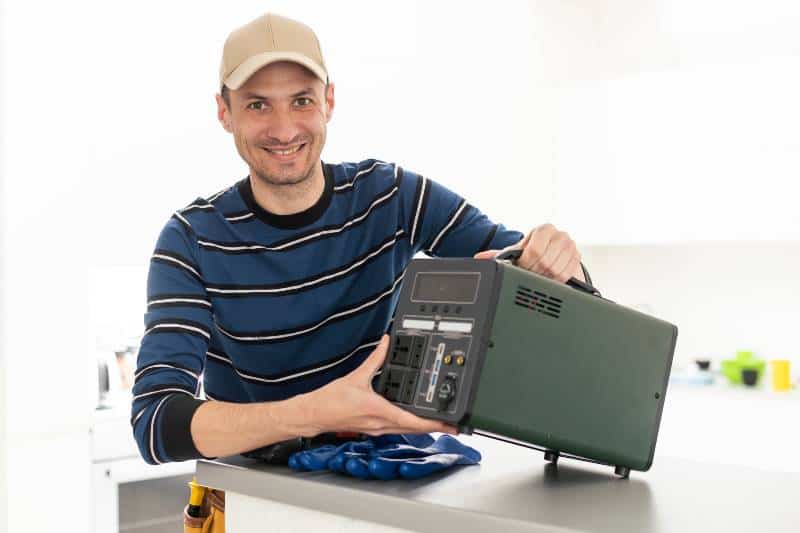
Portable Solar Generators during Electricity Blackout FAQs
What are the costs associated with setting up a solar generator?
The overall costs associated with setting up a solar generator will depend on several factors, including the size of the system, the capacity of the battery, and any additional equipment that you may need. Generally, smaller systems tend to be cheaper than larger ones.
Can a solar generator power my entire home?
It depends on the size of your home and the type of appliances you need to power. Solar generators can typically handle smaller-scale applications like powering lights, charging cell phones, and running small devices. For more extensive power needs or large homes, larger solar generators with higher storage capacities may be necessary.
How do weather conditions affect the efficiency of a solar generator?
Solar generators are heavily dependent on the weather and sunlight to function. During cloudy weather or at night, solar generators rely on stored energy from their batteries. Additionally, during extreme weather conditions like hail storms or strong winds, it’s best to move the solar panels away from direct exposure as they can be damaged by strong gusts of wind or hail.
Are solar generators safe to use indoors?
Solar generators are typically designed for outdoor use. While some solar panels might be safe to use indoors, it’s best to consult the manufacturer’s guidelines before using them in enclosed spaces as they may release fumes that can be harmful when inhaled. Additionally, check local regulations regarding the use of solar generators inside your home or business.
What are the environmental benefits of using a solar generator?
Solar generators are powered by renewable energy sources, such as the sun or wind. This makes them much more eco-friendly than traditional fuel-powered generators, which produce emissions that can be damaging to the environment. Additionally, solar generators require minimal maintenance, helping you save time and money in the long run.
Conclusion
Portable solar generators are a dependable, energy-efficient solution to ensure power continuity and peace of mind during electricity blackouts. Not only will you be able to eliminate fuel costs and reduce maintenance, but you’ll also be doing your part in helping the environment. Investing in a solar generator may seem daunting at first, but if taken care of, it will provide you with years of reliable use and long-term savings.
Whether at home or for your business, this is the power source you can rely on when the unpredictable happens.
So if you’d like to stay informed on other green solutions like these portable solar generators, then feel free to subscribe to our newsletter for up-to-date news and information. We are always available for more guidance, so don’t hesitate to reach out for electrifying living today!
